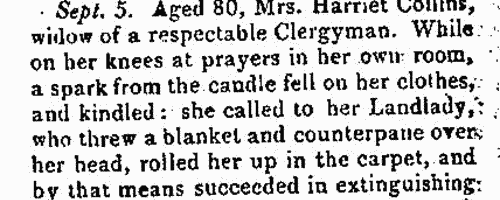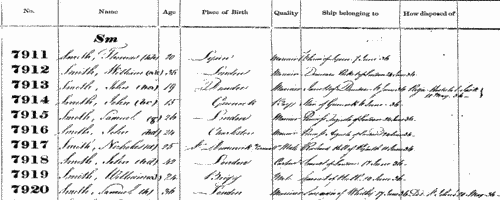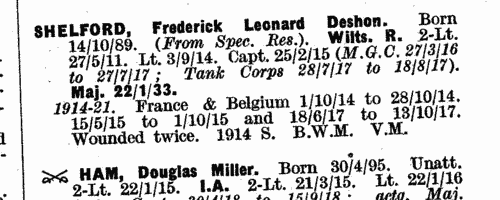Reddock Surname Ancestry ResultsOur indexes 1000-1999 include entries for the spelling 'reddock'. In the period you have requested, we have the following 7 records (displaying 1 to 7): Buy all | | | Get all 7 records to view, to save and print for £36.00 |
These sample scans are from the original record. You will get scans of the full pages or articles where the surname you searched for has been found. Your web browser may prevent the sample windows from opening; in this case please change your browser settings to allow pop-up windows from this site. Scottish litigants, rebels and cautioners
(1569-1578)
The Privy Council of Scotland exercised a superior judicial authority in the kingdom, and consequently received and dealt with a constant stream of petitions, as well as dealing with the internal security of the state. This register of the council from July 1569 to June 1578, in the reign of king James VI, was edited by John Hill Burton, Historiographer Royal for Scotland, and published under the direction of the Lord Clerk Register of Scotland in 1878. Some of the individuals mentioned are the complainants, those of whom they complained, and the sureties on both sides: at this period, some of the complainants are alleging serious attacks, often of a feuding nature. Many of the bonds entered into by the cautioners are promises to keep the peace towards such enemies. Failure to answer to the council when summoned was a serious contempt, leading to being denounced a rebel, with serious consequences. But 'horning' was also used in the pursuit of debts: there was no imprisonment for debt in Scotland, but a creditor could have an obstinate debtor ordered, in the sovereign's name, to pay what was due, failing which, the debtor could be put to the horn, denounced as a rebel, and imprisoned as a rebel.
REDDOCK. Cost: £4.00.  | Sample scan, click to enlarge

| Deaths, Marriages, News and Promotions
(1773)
Death notices and obituaries, marriage and birth notices, civil and military promotions, clerical preferments, and bankrupts, as reported in the Gentleman's Magazine. Mostly from England and Wales, but items from Ireland, Scotland and abroad.
REDDOCK. Cost: £4.00.  | Sample scan, click to enlarge

| Deaths, Marriages, News and Promotions
(1814)
Death notices and obituaries, marriage and birth notices, civil and military promotions, clerical preferments and domestic occurrences, as reported in the Gentleman's Magazine. Mostly from England and Wales, but items from Ireland, Scotland and abroad.
REDDOCK. Cost: £4.00.  | Sample scan, click to enlarge

|  British merchant seamen
(1835-1836) British merchant seamen
(1835-1836)
At this period, the foreign trade of ships plying to and from the British isles involved about 150,000 men on 15,000 ships; and the coasting trade about a quarter as many more. A large proportion of the seamen on these ships were British subjects, and so liable to be pressed for service in the Royal Navy; but there was no general register by which to identify them, so in 1835 parliament passed a Merchant Seamen's Registration Bill. Under this act this large register of British seamen was compiled, based on ships' crew lists gathered in British and Irish ports, and passed up to the registry in London. Each seaman was assigned a number, and the names were arranged in the register by first two letters of the surname (our sample scan shows one of the pages for 'Sm'); in addition, an attempt was made to separate out namesakes by giving the first instance of a name (a), the second (b), and so on. But no effective method was devised to prevent the same man being registered twice as he appeared in a second crew list; moreover, the original crew lists were clearly difficult for the registry clerks to copy, and some of the surname spellings appear to be corrupted. A parliamentary committee decided that the system devised did not answer the original problem, and this register was abandoned after less than two years: but it is an apparently comprehensive source for British merchant seamen in 1835 to 1836. The register records the number assigned to each man; his name; age; birthplace; quality (master, captain, mate, 2nd mate, mariner, seaman, fisherman, cook, carpenter, boy &c.); and the name and home port of his ship, with the date of the crew list (usually at the end of a voyage). Most of the men recorded were born in the British Isles, but not all (for instance, Charleston and Stockholm appear in the sample scan). The final column 'How disposed of' is rarely used, and indicates those instances where a man died, was discharged, or deserted his ship during the voyage.REDDOCK. Cost: £8.00.  | Sample scan, click to enlarge

| Soldiers' Balances Unclaimed
(1882)
The War Office, under 'The Regimental Debts Act, 1863' compiled and published lists of names of deceased soldiers whose personal estate was held by the Secretary of State for War for distribution amongst the Next of Kin or others entitled. These lists give full name (surname first), rank, regiment, and the amount of the estate unclaimed. During 1882 new lists CXLI to CL relating to recent deaths were issued, as well as republications of lists XCI to CL from previous years showing details of balances still remaining unclaimed. REDDOCK. Cost: £6.00.  | Sample scan, click to enlarge

| Inhabitants of county Armagh
(1888)
Bassett's Book of Antrim is a directory listing traders, farmers and private residents in the county, with notes on local manufacture and for anglers and sportsmen.REDDOCK. Cost: £6.00.  | Sample scan, click to enlarge

| Officers of the British Army and of the Indian Army
(1934)
The Half-Yearly Army List, issued By Authority, 30 June 1934, lists all officers in active service at that date, and this list was evidence of the status and rank of the officers contained in it. The entries are set out as a gradation list, by rank, from field-marshals to lieutenants, and within each rank in order of seniority at that rank. Each officer's name (surname first, in capitals, then christian name and present rank (with date of achieving that rank) and regiment &c. are given, for convenience, in bold type, with any national decorations in italics after the name. Each entry also gives date of birth, number of days service in the ranks, dates of service in each rank of officer, particular offices and postings (with dates) and, where appropriate, a summary of war service, and medals. For all but the oldest of the officers then serving, the war service details are for the Great War (1914-1921), and campaigns in Iraq, Waziristan, and the North West Frontier of India. War services are not given in this edition for Indian Army officers, except in that their entries are preceded by a crossed swords symbol where they have seen war service in a theatre of war overseas. After the gradation list of officers, there is a section for the Royal Malta Artillery; and then (pages 1152 to 1185) warrant officers - staff or garrison serjeant-majors, educational serjeant-majors, serjeant-major (physical training and educational) instructors, regimental serjeant-majors (and corporal-majors, farrier-serjeant majors, master gunners, assistant instructors in gunnery, experimental serjeant-majors, artillery clerks, farrier-serjeant-majors, artificer serjeant-majors, clerks of works, mechanist, superintending clerks, draughtsmen, 1st class staff serjeant-majors, transport, supply, conductors, sub-conductors, armourers, armament artificers, headmasters, schoolmasters, marine gunners, and bandmasters. The section for the Royal Army Chaplains' Department lists all chaplains (1st to 3rd class); and that for Queen Alexandra's Imperial Military Nursing Service has all matrons, sisters and staff nurses. The lists of nurses do not give date of birth: all are unmarried. The book concludes with the Yeomen of the Guard, the Honourable Company of Gentlemen-at-Arms, and the King's Body Guard for Scotland, in each case giving name (surname and initials, not christian names), honours, name of late regiment, and date of appointment.
REDDOCK. Cost: £4.00.  | Sample scan, click to enlarge

|
Research your ancestry, family history, genealogy and one-name study by direct access to original records and archives indexed by surname.
|










